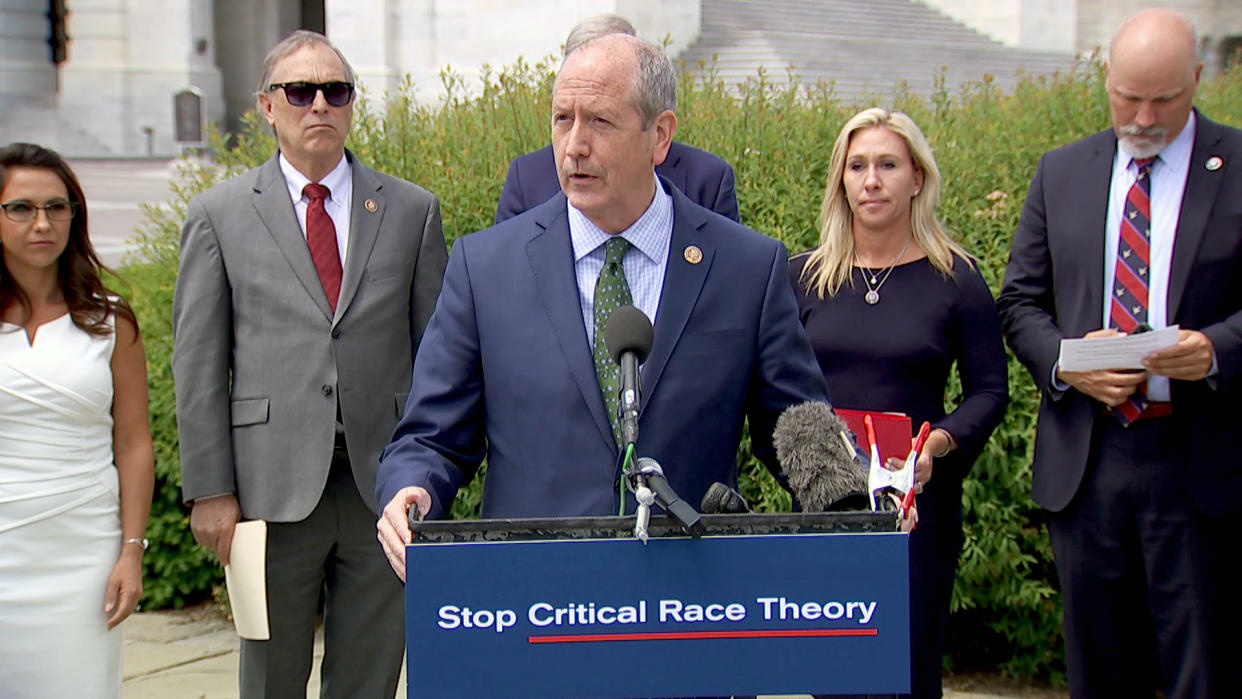GOP unveils bills to 'restrict' critical race theory

A group of House Republicans on Wednesday took recent attacks on critical race theory a step further by introducing a pair of bills to ban diversity training for federal employees and the military.
Some 30 GOP representatives have signed on to support both the Combatting Racist Training in the Military Act and the Stop CRT Act, Rep. Dan Bishop of North Carolina said at a news conference in Washington.
The first bill is a companion to legislation introduced by Sen. Tom Cotton of Arkansas that aims to prohibit teaching “Anti-American and racist theories" such as critical race theory at any academic institution related to the U.S. Armed Forces. The Stop CRT Act works to codify former President Donald Trump’s executive order banning diversity and racial equity training for federal employees — an order President Joe Biden reversed in January.
“Critical race theory is a divisive ideology that threatens to poison the American psyche," Bishop said at the news conference. "For the sake of our children’s future, we must stop this effort to cancel the truth of our founding and our country.”
He said the initial bill “stands for the idea that CRT does not belong in our armed forces. The Stop CRT Act will be the most comprehensive legislation to restrict the spread of CRT.”
The bills are the latest in a string of proposed legislation targeting diversity and anti-racism teaching — which is being characterized as critical race theory — in several states across the country. Such bills in Idaho, Louisiana, Rhode Island and Tennessee target the teaching of anti-racism in schools.
Conservative leaders began focusing on critical race theory after Trump used the decades-old academic term in a September 2020 memo ordering the Office of Management and Budget to stop funding diversity training. Around the same time, educators were using the Pulitzer Prize-winning 2019 New York Times "1619 Project" in the classroom to teach a more holistic history of the country. So, Republican leaders began publicly criticizing both the project and critical race theory, often using the term to describe all anti-racism efforts.
“Many that are condemning critical race theory haven’t read it or studied it intensely,” Jonathan Chism, assistant professor of history at the University of Houston–Downtown and co-editor of "Critical Race Studies Across Disciplines," previously told NBC. “This is largely predicated on fear: the fear of losing power and influence and privilege. The larger issue that this is all stemming from is a desire to deny the truth about America, about racism.”
Critical race theory is a concept that seeks to understand racism and inequality in the United States by exploring and exposing the ways it affects legal and social systems. The school of thought was founded by academics including Derrick Bell, Alan Freeman, Richard Delgado, Kimberlé Crenshaw and others in the 1970s and ‘80s and builds on critical legal studies and radical feminism.
On Wednesday, the Republican leaders said they hope the two proposed bills will continue the work Trump started. The news comes just hours after the Texas House passed a bill to limit what educators can teach about the nation’s history of racism and contentious current events. Dozens of education, business and community groups in the state condemned the bill, noting that it would limit local control. Texas state Rep. Jarvis Johnson, a Democrat from Houston, called the bill “tyranny,” according to The Texas Tribune.
“We have come to this body and have made the decision to tell our teachers how and what to teach,” Johnson told the paper, noting that there is “not one agency that has compelled a teacher to teach critical race theory, so this author literally is legislating nothing — an overreach of power.”

